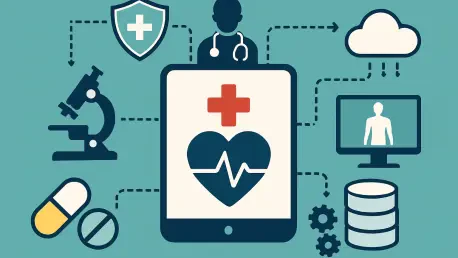The healthcare industry stands at a pivotal moment where the integration of data and technology is transforming the way care is delivered, opening up unprecedented career opportunities for professionals across various fields. With millions of data points generated daily from electronic health records, wearable devices, and genomic research, the sector is grappling with how to harness this information to improve patient outcomes while maintaining a human touch. This roundup dives into diverse perspectives from industry experts, analysts, and professionals on how the fusion of data science and patient care is reshaping healthcare careers. The purpose is to illuminate emerging roles, evolving skill demands, and the broader implications for the future of medicine through a collection of insights and practical tips.
Diverse Perspectives on the Data-Driven Healthcare Shift
Emerging Roles at the Intersection of Tech and Medicine
Insights from various industry observers highlight a surge in specialized positions that blend technology with healthcare. Health informatics specialists and AI engineers are increasingly vital, tasked with managing vast datasets and developing tools for diagnostics. One viewpoint emphasizes that these roles are growing rapidly, with projections suggesting a significant rise in demand for such professionals from 2025 to 2027, driven by the need for efficient data interpretation in hospitals.
Another perspective focuses on the real-world impact of these roles, noting how AI-driven systems are already aiding in early disease detection in numerous medical facilities. However, some caution that while these positions enhance precision, there remains a critical need for oversight to ensure algorithms do not overshadow clinical judgment. This balance between innovation and accountability is a recurring concern among contributors.
A third angle points to the accessibility of these career paths, suggesting that individuals from non-medical backgrounds can enter the field with targeted training in data science. This democratization of opportunity is seen as a way to diversify the healthcare workforce, though it raises questions about maintaining consistent standards across varied skill sets.
Transformation of Traditional Healthcare Roles
The evolution of conventional roles like physicians and nurses through data integration garners varied opinions. Some industry voices stress that data literacy has become a fundamental skill, with clinicians now using dashboards for real-time patient monitoring. This shift is credited with improving decision-making, allowing for quicker responses to patient needs through predictive analytics.
Conversely, a differing stance warns of potential pitfalls in over-reliance on digital tools. There’s a concern that technology might erode the personal connection between caregivers and patients if not carefully managed. Examples are cited where automated systems have occasionally misprioritized urgent cases, underscoring the importance of human intuition in high-stakes scenarios.
Yet another perspective celebrates the empowerment of traditional roles through technology, pointing to pharmacists utilizing data to customize medication plans with greater accuracy. This view advocates for continuous education to ensure that frontline workers remain adept at interpreting complex data outputs, thereby enhancing rather than replacing their expertise.
Innovative Trends Driving Future Career Paths
Cutting-edge advancements like machine learning in drug development and genomic analysis are shaping new career trajectories, according to multiple sources. One opinion highlights how these technologies are creating roles for bioinformatics experts who analyze genetic data to tailor therapies, a field seen as pivotal for personalized medicine.
A contrasting take examines regional disparities in adopting such innovations, noting that while some areas are quick to integrate advanced systems, others lag due to resource constraints. This uneven progress raises ethical questions about equitable access to data-driven care and the potential widening of global health gaps.
Additionally, there’s a critical viewpoint questioning whether technology always equates to better outcomes. Concerns are raised about data privacy and the moral implications of using patient information for predictive modeling, urging professionals to navigate these trends with a strong ethical framework in mind.
Bridging Clinical and Technical Expertise
The need for hybrid professionals who combine medical knowledge with data proficiency is a common thread among expert opinions. One source argues that such interdisciplinary skills are becoming the gold standard, enabling individuals to translate clinical needs into technical solutions effectively.
Another perspective compares career progression, noting that while traditional clinicians may take longer to adapt to data tools, emerging data specialists often lack deep patient care experience. This gap suggests a need for collaborative training models that blend both domains, a strategy some industry leaders are already championing.
A further insight speculates on the long-term impact of this dual expertise, positing that it could redefine care standards by fostering a more proactive approach to health management. This vision encourages current and aspiring professionals to seek cross-disciplinary learning opportunities to stay relevant in an evolving landscape.
Key Takeaways and Actionable Advice for Aspiring Professionals
Gathering these varied insights reveals a consensus that data is fundamentally altering healthcare careers, creating new opportunities while transforming established roles. For those looking to enter or advance in this dynamic field, pursuing certifications in health informatics or data analytics is frequently recommended as a starting point. Engaging with AI tools through practical workshops can also provide a competitive edge.
Another practical tip is to explore interdisciplinary programs that combine clinical and technical training, ensuring a well-rounded skill set. Staying updated on ethical considerations surrounding data use in medicine is equally important, as it prepares professionals to handle sensitive issues responsibly. These steps collectively position individuals to thrive at the forefront of a data-driven healthcare era.
Reflecting on the Insights Gained
Looking back on this roundup, the diverse opinions and tips shared by industry voices paint a vivid picture of a healthcare sector in transformation, driven by the powerful merger of data and patient care. The discussions underscore both the promise of innovation and the challenges of maintaining a human-centric approach. Moving forward, readers are encouraged to delve deeper into specific areas of interest, such as health informatics or AI applications in medicine, by seeking out relevant resources and communities. Taking proactive steps to build hybrid skills or advocate for ethical data practices can further solidify one’s place in shaping a healthier, more precise future for healthcare delivery.









